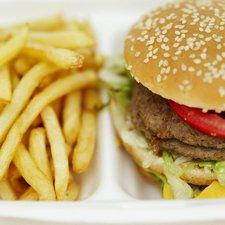What are Fats?
- Abby Gaidos
- May 28, 2015
- 1 min read
Fat is a nutrient that lives within our bodies. It is crucial for normal body function and without it we could not live. Not only does fat supply us with energy, it also makes it possible for other nutrients to do their jobs. Fats, which consist of a wide group of compounds, are usually soluble in organic solvents and insoluble in water. Chemically, fats are usually known as triesters of glycerol and fatty acids (triester = one of three ester chemical groups). At room temperature fats may be present in either liquid or solid form, this depends on their structure and composition.

Examples of fats in every day foods
1. Oils - Any fat which exists in liquid form at room temperature. Oils are also any substances that do not mix with water and have a greasy feel.
2. Fats - All types. However, fats are commonly referred to as those which are solid at room temperature.
3. Lipids - All types of fats, regardless of whether they are liquid or solid.
4. Animal fats - butter, lard, cream, fat in (and on) meats.
5.Vegetable fats - olive oil, peanut oil, flax seed oil, corn oil.














Comments